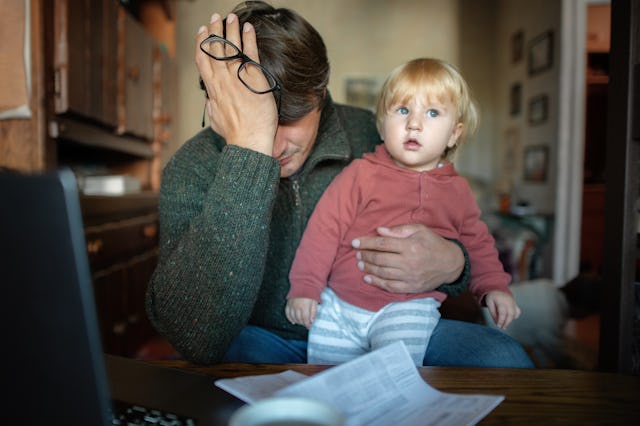Looks Like Dads Could Be A Big Cause Of Your Toddler’s "Terrible Twos"
A new study has linked behavioral issues in toddlers to fathers who are highly stressed during the child’s development.

While many people assume that moms are the more influential parent when it comes to children’s behavior, researchers are now finding that a father’s general disposition during the early years of kid’s life can significantly affect their child’s growth and development.
According to new research, behavioral issues in toddlers such as crying, tantrums, and aggression have been linked to fathers who are highly stressed during a child’s early development.
King’s College London (KCL) found that, after looking through data from more than 1,800 parents, when a father is stressed during a kid’s first years, his child is two to three times more likely to have behavioral issues as a toddler.
To find their results, the study asked new fathers to rate how stressed they were on a scale of 1 to 20. Anything over 10 was deemed to be a “high” stress level. Of the dads who were two years into fatherhood, 1 in 10 fathers met this “high” stress criteria — and those dads had kids who were two to three times more likely to experience behavioral problems.
“Our study found that paternal stress makes a unique contribution to child outcomes, particularly during the early postpartum months,” leader of the study and Clinical Psychologist at King’s IoPPN Dr. Fiona Challacombe wrote in the study.
So, why are dads so stressed out, and why does this affect children and the household? There could be a few reasons.
One theory Dr. Challacombe touches on is that men may just not be able to regulate their emotions or get proper help for their anxiety and life stressors. “... men may be reluctant to seek help or express their needs during this time and may feel excluded from the maternal focus of perinatal services,” she wrote.
Like all humans, men included, seeking professional help to manage stress is a helpful option. Not only will active work on themselves be beneficial but it will help lower the stress of the entire household.
Which leads to another theory: dad’s stressors reflect back on mom — who, in most homes, is the primary caregiver. This in turn affects the children in the house and leads to behavioral issues.
What can dads do to stop this trickledown of anxiety?
“Explicit effort may be required to engage fathers in discussions about the types of support they may need to manage stress and wellbeing and help prevent future difficulties for their children at what might be a sensitive stage of development,” Dr. Challacombe recommends in her study.
She suggests that stressed out dads talk to other dads about their feelings, seek therapy, do couples work and give themselves the grace of adjusting to fatherhood instead of “toughing it out” to help them through those first few years of fatherhood.
Is there a better reason to take care of yourself and stress load than for the benefits of your child’s mental health and wellbeing? Maybe this will be the starting off point to get so many more men (and women) seeking the professional help that everyone needs.